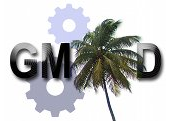GMOD
January 2009 GMOD Meeting

|
January 2009 GMOD
Meeting January 15-16, 2009 Following PAG 2009 San Diego, California, USA |
 |
This GMOD community meeting was held January 15-16, 2009, in San Diego, immediately following Plant and Animal Genome (PAG 2009). There were over 50 participants at the meeting.
Contents
- 1 Agenda
- 2 Themes and Discussions
- 3
Presentations
- 3.1 The State of GMOD
- 3.2 GMOD Help Desk
- 3.3 A RESTful Interface for MODs?
- 3.4 Data Representation in Chado: Best Practices
- 3.5 Generic Gene Page XML
- 3.6 BioMart
- 3.7 JBrowse
- 3.8 GMODWeb and Package Management
- 3.9 EcoliWiki and TableEdit
- 3.10 WebGBrowse: GBrowse Configuration Management
- 3.11 Drupal and MarineGenomics.org
- 3.12 Artemis and Chado at GeneDB
- 3.13 Chado and GUS at SBRI
- 3.14 modENCODE: extending Chado, BIR-TAB, & GBrowse for automating data validation & display
- 3.15 BeeSpace
- 3.16 Metadata Input and Submission Tool and GIS linked metagenomic database
- 3.17 Bovine Genome Database
- 3.18 GNPAnnot
- 4 Registration
- 5 Agenda Proposals
- 6 Meeting Participants
- 7 Feedback
- 8 Next Meeting: August 2009 at Oxford
Agenda
Thursday, January 15
| Time | Topic | Presenter(s) | Links | |—-|—-|—-|—-| | 10:00 AM | Registration | | | | 10:30 AM | Introductions | Scott Cain | | | 11:00 AM | The State of GMOD | Scott Cain | PPT, Summary | | 11:30 AM | A variety of GMOD Help Desk stuff | Dave Clements | PDF, Summary | | 12:00 PM | Lunch | one hour 30 minutes | | | 1:30 PM | Drupal and MarineGenomics.org | Stephen Ficklin | PDF, Summary | | 2:00 PM | Artemis and Chado at GeneDB | Robin Houston | PPT, PDF, Summary | | 2:30 PM | modENCODE: extending Chado, BIR-TAB, & GBrowse for automating data validation & display | Nicole Washington | PDF, Summary | | 3:00 PM | Break | | | | 3:30 PM | A RESTful interface for MODs? | Josh Goodman | PPT, PDF, Summary, Discussion | | 4:00 PM | Metadata Input and Submission Tool and GIS linked metagenomic database | Iddo Friedberg and Christopher Condit | PDF, Summary | | 4:30 PM | Data Representation in Chado: Best Practices | Joshua Orvis and/or Scott Cain | Summary, Discussion | | 5:00 PM | Dinner (on your own) | | |
Friday, January 16
| Time | Topic | Presenter(s) | Links |
|---|---|---|---|
| 9:00 AM | Chado and GUS at SBRI | Dhileep Sivam and Isabelle Phan | PPT, PDF, Summary, Discussion |
| 9:30 AM | BioMart | Arek Kasprzyk | PDF, Summary |
| 10:00 AM | BeeSpace | Barry Sanders, Dave Arcoleo | PPT, Summary |
| 10:30 AM | Break | ||
| 11:00 AM | WebGBrowse GBrowse configuration management, Summary | Ram Podicheti | PPT, PDF, Summary |
| 11:30 AM | JBrowse (aka GBrowse 3.0) | Mitch Skinner | ODP, PDF, Summary |
| 12:00 PM | Lunch | one hour 30 minutes | |
| 1:30 PM | EcoliWiki and TableEdit | Daniel Renfro | I tried, but all I get is
errors. And PowerPoint makes a 10MB pdf, which is way too big to upload. Contact me if you want a copy., Summary |
| 2:00 PM | Generic Gene Page XML | Scott Cain | PPT, PDF, Summary, Discussion |
| 2:30 PM | GMODWeb and package management | Brian O'Connor | PPT, PDF, Summary |
| 3:00 - 5:00 PM | MIGS and MIMS | Iddo Friedberg | Summary |
| Bovine Genome Database | Justin Reese and Chris Childers | PPT, PDF, Summary | |
| GNPAnnot | Pierre Larmande | ChadoControler, Summary |
Themes and Discussions
Several themes ran throughout the meeting
Data Sharing
Several presentations touched on this:
- A RESTful Interface for MODs?
- Data Representation in Chado: Best Practices
- Generic Gene Page XML
- Chado and GUS at SBRI
A common question during these talks was how much should we do? Should we implement a comprehensive data sharing protocol or start with very modest goals, or should we aim for a sweet spot in the middle? Should we emphasize robustness or ease of implementation? Should GMOD support semantic web efforts?
Josh Goodman argued that RESTful interfaces provide the highest payoff for the least amount of effort – that RESTful was both useful and the easiest to implement.
The semantic web in general and SSWAP in particular was discussed. Ren Nelson of SoyBase pointed out that SoyBase’s map data is now available through SSWAP. RDF, the Bio2RDF projct, and the Swoogle semantic web search engine were also mentioned.
Josh Goodman, Rob Buells, Rex Nelson, and Kevin Clancy formed the Web services working group and will continue and expand this discussion with the GMOD community.
Joshua Orvis’s “Data Representation in Chado: Best Practices” session dealt with the same issue, this time in the context of representing biology within Chado in the same way across organizations. In this session we proposed converging on common representations by having organizations post their current Chado practices to the wiki, discussing them on the wiki or on the GMOD-Schema mailing list, and then converging on a common set of Chado best practices. Common practices would enable both data sharing and common tools. Joshua got the ball rolling by describing IGS’s Chado practices on the IGS Data Representation page.
RDF got additional discussion during Dhileep Sivam and Isabelle Phan’s session on Chado and GUS at SBRI. Uniprot uses RDF to represent their data. XML gives you a tree representation, while RDF gives you a graph of RDF files. Graphs more often better reflect what is being described. Sparql is the standard query language for accessing RDF.
Presentations
The presentations are listed here in a very approximate order:
- GMOD Project Presentations
- GMOD Components
- GMOD User Experiences
